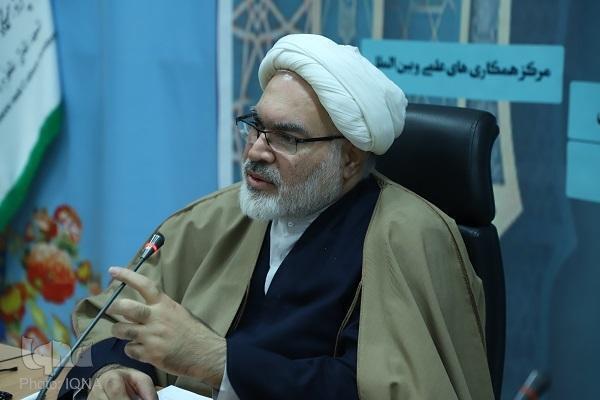Imam Hussein’s Uprising Was Resistance to Hypocrisy, Injustice

Speaking at a scholarly forum in Qom on Tuesday, Hojat-ol-Islam Najaf Lakzaei, a faculty member at Baqir al-Olum University, underscored the enduring relevance of Imam Hussein’s (AS) uprising as a model of Quranic governance and resistance against injustice. The event was the third in a series of discussions on Quranic leadership and the legacy of Imam Hussein (AS).
“Imam Hussein (AS), through his uprising and martyrdom, not only defended Islam but showed all of humanity that the path and conduct of Yazid and his followers had nothing to do with the true message of Islam,” said Lakzaei.
Lakzaei, who also heads the Islamic Sciences and Culture Academy in Qom, stressed that Imam Hussein’s (AS) uprising was not motivated by personal ambition. “At the outset of his movement, Imam Hussein (AS) made it clear that his uprising was not driven by oppression, corruption, arrogance, or selfishness,” he said. “Rather, it was a continuation of the tradition and conduct of the Prophet Muhammad (PBUH) and Imam Ali (AS), aimed at reforming the Islamic community.”
He warned that the gravest danger to any Islamic society comes not from external enemies, but from within. “The greatest threat to the Muslim community is the danger of hypocrisy and the hypocrites.”
Read More:
According to Lakzaei, the Quran repeatedly emphasizes this internal threat in several chapters, including al-Baqara, al-Tawba, and al-Munafiqun. “The Quran makes it clear that the threat posed by hypocrites is greater than that of open disbelievers,” he explained. “The falsehood of disbelief is evident to Muslims, but hypocrisy—cloaked in religious appearance—betrays Islam from within.”
Quoting verses from Surah al-Mumtahina, Lakzaei noted that even disbelievers are categorized by the Quran. “The Quran distinguishes between those who are hostile and those who are not. It is possible to treat non-hostile disbelievers with justice and fairness. But hypocrites, who outwardly claim to be Muslim and swear solemn oaths, have no real belief in Islam.”
“This is the same dangerous current that Imam Hussein (AS) confronted at the highest level,” Lakzaei said. “He exposed the rule of hypocrisy and revealed that Yazid’s governance was inherently unjust and corrupt—completely at odds with Quranic leadership.”
Lakzaei argued that true Quranic governance, as seen in the reigns of figures like Prophet Yusuf (AS), Talut, Prophet Solomon (AS), and Dhu al-Qarnayn, is based on truth and the rejection of falsehood. “The Prophet Muhammad (PBUH) and Imam Ali (AS) continued on this path, but the hypocrites have always been—and still are—obstacles to its realization.”
Read More:
He pointed out that this hypocrisy reached its peak when certain factions stood in open defiance against an infallible Imam. “The hypocrites did not start with Imam Hussein (AS). They had previously opposed the Prophet (PBUH), Imam Ali (AS), and Imam Hassan (AS). Eventually, they formed ranks against the rightful Imam in Karbala.”
Addressing the present-day situation in the Muslim world, Lakzaei said, “Today, the Islamic world is still plagued by hypocrisy. There are those who appear Muslim, but align themselves with the enemies of Islam. They threaten the unity of the Muslim ummah. Some even claim to support Palestine, but meet secretly with Zionists.”
4292062



